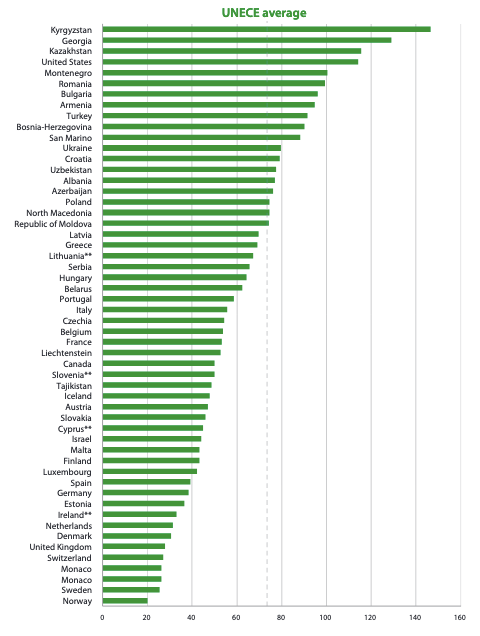Mobility Matters Daily #103 - Trains, boats, EVs and e-scooters
Plus another newsletter you should sign up for
Good morning friend.
I really value my weekends. But over the years I have come to value them in a completely different way. Earlier in my career they were opportunities to learn, and to catch up on work for my part-time Masters Degree. Now, I just love having free days of doing little, and importantly giving my brain a rest.
After a hectic month, I may start taking the advice of Tim Denning. Cancelling meetings, attending by exception, and doing the work - the stuff that I really enjoy doing. A Zoom and Teams detox is needed for us all I think.
To start decarbonising long distance transport, take the train and the boat
Much of our talk on decarbonising transport focusses on short distance personal trips. For good reason, as they make up the majority of trips, and are more tangible. But long distance trips are still important, and work by the European Environmental Agency shows that rail and boat are key to decarbonising these trips.
The presence of boats is driven by one thing. They are incredibly efficient ways of moving freight, being over twice as efficient as rail, and significantly more efficient than aircraft. But this also depends on the type of freight being hauled, and the haulage distance, as well as the total freight being hauled. Maybe I was too hasty in judging the environmental performance of maritime traffic.
Inter-operability of electric vehicle charging points is a barrier to roll out
A recent report by the European Court of Auditors noted that the electric vehicle charging market across the EU is highly fragmented. Or to put it in their words: “Although the charging network is growing across the EU, deployment is patchy, as there are no clear and consistent minimum infrastructure requirements to ensure EU-wide electro-mobility. The EU is still a long way off its ambitious Green Deal target of 1 million charging points by 2025, and it lacks an overall strategic roadmap for electro-mobility. Travel across the EU is further complicated by the absence of harmonised payment systems with minimum requirements and adequate user information on real-time availability and billing details of charging stations.”
This report has been seized upon by the like of Transport and Environment as showcasing the need for regulation. Whilst the likes of the Open Charge Protocol has made some headway in terms of improving interoperability, there is still significant inconsistency in being able to actually use a charging point and paying for it. But change - especially where there is legacy infrastructure - takes time to work through the system and be adopted. But the market is becoming a barrier to its own success, and its time for dealing with it is running out.

Decision time for e-scooters in the UK
The very first trial of e-scooters in the UK - in the Tees Valley - is shortly coming up to its 1st year of operations. Following the delayed start to the trials in major places such as London, all trials have the option of running through to March 2022. Whilst this should mean that e-scooters will be operating in all the trial areas out until this point, the reality is that operational contracts and temporary orders put in place to enable the trials to happen will start to expire over the coming 6 months. This is when decisions will be made about the future of trials.
Tees Valley has said that it is extending its trial with Ginger. Let’s see if other Council’s will be as brave as the Tees Valley Combined Authority in giving e-scooters a greater chance to prove themselves.
Stat of the Day

Back to some traditional transport statistics, showing how many people are killed in road traffic collisions per million inhabitants by country. Great news if you are in Norway and Sweden. But as for Kyrgyzstan and Georgia, its not looking so good.
Data Source: UNECE Database
If you don’t do anything else today, do this…
Sign up to Benjie de la Peña’s excellent Makeshift Mobility newsletter. It is by far the best source of news on informal transport.



